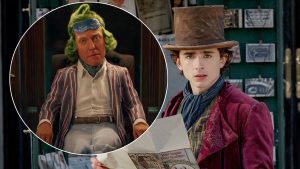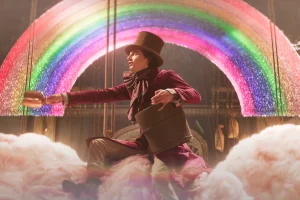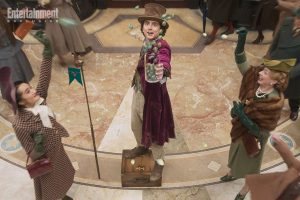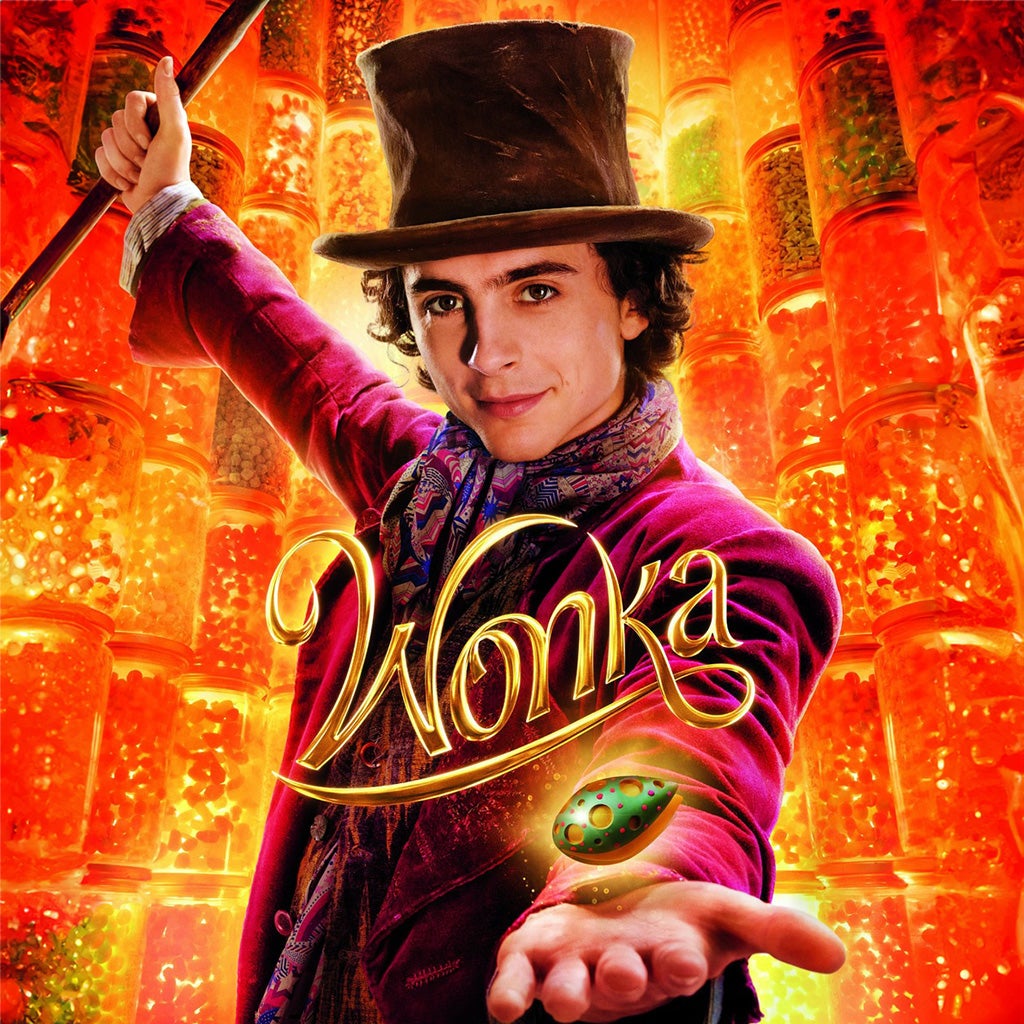A Film Review by Cliff Homewood
Oompa loompa doompety doo
I’ve got a perfect puzzle for you
Oompa loompa doompety dee
If you are wise you’ll listen to me
Wonka has had good reviews. From the makers of the Paddington movies, a good pedigree, and as it started felt like a possible future classic. We’ve done alright with sequels to classics recently, Mary Poppins Returns comes to mind. This is also a full on musical and whilst its new numbers are pleasant, none are particularly memorable. As indicated by the trailers the highlight of the film is Hugh Grant as an Oompa Loompa, alas he’s not in it much and most of his scenes are in the trailers.
 Why Hugh Grant? The Director Paul King states, “I was enchanted by the idea of these impossibly tiny beings, far smaller even than the child-sized me. The voice and the attitude of the Oompa Loompa came from revisiting the books – long songs full of humour, sarcasm, superiority and scorn. So it was really just thinking about that character – someone who can be a real sh*t. And I went, ‘Ah, Hugh [Grant]!’ Because he’s the funniest, most sarcastic sh*t that I’ve ever met! We’d been there before with Paddington 2. I had to write him this awkward letter, saying, ‘You’re good at playing washed-up, old hams…’” This however caused controversy as both previous films had cast actors with dwarfism in the role. Perhaps an actor with dwarfism should have been cast in a different role to compensate?
Why Hugh Grant? The Director Paul King states, “I was enchanted by the idea of these impossibly tiny beings, far smaller even than the child-sized me. The voice and the attitude of the Oompa Loompa came from revisiting the books – long songs full of humour, sarcasm, superiority and scorn. So it was really just thinking about that character – someone who can be a real sh*t. And I went, ‘Ah, Hugh [Grant]!’ Because he’s the funniest, most sarcastic sh*t that I’ve ever met! We’d been there before with Paddington 2. I had to write him this awkward letter, saying, ‘You’re good at playing washed-up, old hams…’” This however caused controversy as both previous films had cast actors with dwarfism in the role. Perhaps an actor with dwarfism should have been cast in a different role to compensate?
The Oompa Loompas are not new to controversy. In the original novel they were miniature pygmies from “the very deepest and darkest part of the African jungle where no white man had ever been before.” Grandpa Joe used to work for the Wonka factory before being laid off, replaced by their slave workforce. Before the film came out in 1971 the National Association for the Advancement of Coloured People (NAACP) threatened to boycott American cinemas and Producers, worried about a negative portrayal of black characters. Our beloved orange skinned, green haired Oompa Loompas were born. Author Dahl agreed to change the characters in his book and when Charlie and the Glass Elevator was published in 1973 a new version of the original was printed. There is currently controversy about publishers making changes to Dahl’s books, so whilst nothing new, it’s different when the author rewrites themselves.
 Although a bit racist by today’s standards, Roald Dahl is a better writer than this film’s screenwriter. Whilst there are Dahl-like concoctions, he knew how to ground the story. Charlie for instance comes from poverty and we feel that from seeing his household and his desperate attempt to collect chocolate wrappers in his desire for a proper life. Wonka turns up in this film similarly destitute, having lost the little he has at the start, with townspeople preying on the naive, Wonka is happy to see it go and is never shown to feel its loss. We see him end up in a workhouse but again it doesn’t rattle him, he is like a visitor to real life who doesn’t feel its effects. This is an issue. Confounded by the fact in the original we are viewing the world through a powerless protagonist, but Wonka is a powerful figure who can produce magic chocolates seemingly out of thin air (at least in this film). From the start Wonka has this power, so although there is some darkness in the film, obstacles to be overcome, he should be able to deal with them effortlessly as he’s the most powerful character in the film. For Wonka, except for one aside where he has run out of giraffe milk so has to go and milk one, ingredients are all always easily available in his magic case. I suspect Roald Dahl would have shown you him struggling to get them.
Although a bit racist by today’s standards, Roald Dahl is a better writer than this film’s screenwriter. Whilst there are Dahl-like concoctions, he knew how to ground the story. Charlie for instance comes from poverty and we feel that from seeing his household and his desperate attempt to collect chocolate wrappers in his desire for a proper life. Wonka turns up in this film similarly destitute, having lost the little he has at the start, with townspeople preying on the naive, Wonka is happy to see it go and is never shown to feel its loss. We see him end up in a workhouse but again it doesn’t rattle him, he is like a visitor to real life who doesn’t feel its effects. This is an issue. Confounded by the fact in the original we are viewing the world through a powerless protagonist, but Wonka is a powerful figure who can produce magic chocolates seemingly out of thin air (at least in this film). From the start Wonka has this power, so although there is some darkness in the film, obstacles to be overcome, he should be able to deal with them effortlessly as he’s the most powerful character in the film. For Wonka, except for one aside where he has run out of giraffe milk so has to go and milk one, ingredients are all always easily available in his magic case. I suspect Roald Dahl would have shown you him struggling to get them.
These underlying issues lead to my problem with the film, its overlong at 2 hours (1971’s Willy Wonka and the Chocolate Factory was just over 90 mins, Burton’s Charlie and the Chocolate Factory is also around 2 hours). When you are making a two-dimensional confection, you want to keep it short. I did not feel the hero was in peril at any moment, if he is drowning, for instance, he only needs to produce an ‘underwater breathing chocolate’ to eat. It’s the same risk that modern Doctor Who flirts with, making the character too powerful and thus any element of threat is diluted.
 The songs whilst enjoyable do not advance the narrative so there are built in toilet breaks. It has an impressively stellar cast, Timothy Chalamet, although dull at the beginning of Dune, acquits himself well here. Tom Daly plays his usual oafish goon. Most of the cast of Ghosts seem to be present, not surprising, as the film is co-written by one of them, Simon Farnaby, who also cameos as a security guard. Olivia Colman is as usual superb and is turning out to be this generation’s Emma Thompson.
The songs whilst enjoyable do not advance the narrative so there are built in toilet breaks. It has an impressively stellar cast, Timothy Chalamet, although dull at the beginning of Dune, acquits himself well here. Tom Daly plays his usual oafish goon. Most of the cast of Ghosts seem to be present, not surprising, as the film is co-written by one of them, Simon Farnaby, who also cameos as a security guard. Olivia Colman is as usual superb and is turning out to be this generation’s Emma Thompson.
It’s the perfect concoction for Christmas being colourful and cheery and a pleasant enough watch, although Rowan Atkinson felt somewhat wasted. It does not however live up to the Director’s standard of the two Paddington films. Wonka at the outset makes clear this is a fantasy where real life rules don’t apply, a mis-step as it limits relatability. Paddington got away with it having a feeble protagonist, but Wonka is invariably powerful.

